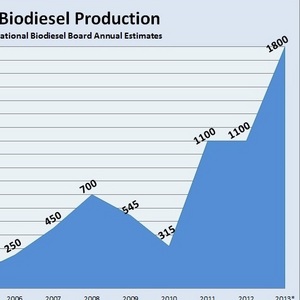2014 US biodiesel numbers down slightly amid policy uncertainty

Source: National Biodiesel Board
January 15, 2015
BY The National Biodiesel Board
The U.S. biodiesel market shrunk in 2014 amid policy uncertainty in Washington that destabilized the industry and caused many biodiesel plants to shut down or reduce production.
According to EPA data released Jan. 15, total U.S. biodiesel consumption fell to 1.75 billion gallons for the year, down slightly from nearly 1.8 billion gallons in 2013. The downturn came as the Obama administration failed to finalize biodiesel volumes under the renewable fuel standard (RFS) and Congress allowed the biodiesel tax incentive to lapse at the beginning of 2014.
“These numbers reflect the consequences of policy inaction,” said Joe Jobe, CEO of the National Biodiesel Board, the industry trade association. “The drop in production represents lost jobs and economic activity. It represents a lost opportunity to reduce greenhouse gas emissions and other pollutants. And it represents another year in which we fail to tackle our dangerous dependence on oil in the fuels sector.”
Advertisement
“The numbers would have been even lower had the EPA not signaled throughout the year that it will strengthen the RFS proposal and finalize it promptly,” Jobe said. “But companies can operate on faith for only so long. We have already seen many producers close their doors, and many others are struggling to stay open as we enter a new year with continued uncertainty.”
“The most frustrating aspect is that this is completely unnecessary,” Jobe added. “This is an industry that should be growing, and that has proven it can expand with smart policies in place. Yet we have this paralysis in Washington. Biodiesel companies simply can’t plan for growth or hire new people with the kind of uncertainty we have now.”
Biodiesel, made from a variety of resources including recycled cooking oil, plant oils such as soybean oil, and animal fats, is the first EPA-designated advanced biofuel to reach commercial-scale production nationwide. According to the EPA, biodiesel reduces greenhouse gas emissions by 57 percent to 86 percent compared with petroleum diesel. With plants in nearly every state in the country, the industry supports some 60,000 jobs.
Advertisement
The EPA figures, which can be found here, reflect U.S. consumption of biomass-based diesel, the vast majority of which is produced domestically.
After the record year of nearly 1.8 billion gallons in 2013, the EPA initially proposed in November 2013 to hold the 2014 RFS biodiesel volume at 1.28 billion gallons. The agency subsequently withheld a final rule and has still not established 2014 volumes, even as it has signaled that it will improve the original proposal. The continued uncertainty throughout the year has left the industry in a state of limbo, although many biodiesel companies continued producing based on assurances from the administration that RFS volumes would increase.
Additionally, Congress once again allowed the $1-per-gallon biodiesel tax incentive to expire on Jan. 1. It marks the fourth time in six years the incentive has been allowed to expire. Congress reinstated the incentive late last year, covering 2014 but not 2015.
“We are calling on the Obama administration to get things back on track immediately by finalizing biodiesel RFS volumes that pave the way for stable growth in the coming years,” Jobe said. “Additionally, we are urging Congress to reinstate the biodiesel tax incentive now instead of procrastinating until the final days of the session.”
Related Stories
ATOBA Energy and Air Moana are partnering to implement scalable solutions for the supply of SAF. The collaboration aims to ensure long-term SAF availability while supporting local initiatives to develop sustainable fuel production in Tahiti.
While final IRS guidance is still pending, the foundation of the 45Z program is well defined. Clean fuel producers should no longer be waiting; they can now move forward with critical planning and preparation, according to EcoEngineers.
The IRS on July 21 published a notice announcing the 2025 calendar-year inflation adjustment factor for the Section 45Z clen fuel production credit. The resulting adjustment boosts maximum the value of the credit by approximately 6%.
The U.S. Senate on July 23 voted 48 to 47 to confirm the appointment of Aaron Szabo to serve as assistant administrator of the U.S. EPA’s Office of Air and Radiation. Biofuel groups are congratulating him on his appointment.
U.S. Secretary of Agriculture Brooke L. Rollins today announced the reorganization of the USDA, refocusing its core operations to better align with its founding mission of supporting American farming, ranching, and forestry.
Upcoming Events










